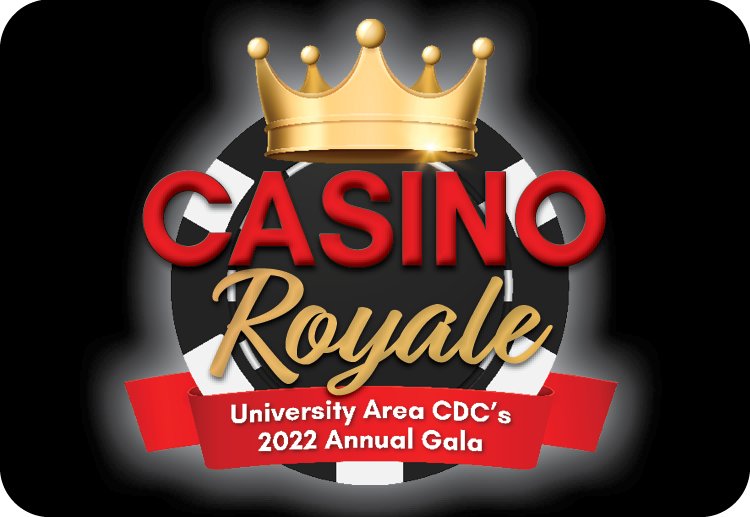The University Area CDC is gearing up for its 2022 gala. The gala theme is Casino Royale and it will be on Saturday, November 5. This gala is the University Area CDC’s largest fundraiser of the year, used not only to celebrate the organization’s accomplishments but also to raise contributions for operations and programs. University Area CDC, or Community Development Corporation, funds community projects to support the low-income area.
University Area CDC Gala
This year’s event will feature an exclusive high roller reception, casino gaming, a silent auction, magician Antwon Towner, Prodigy Cultural Arts youth, live entertainment, dancing, an art gallery, dinner, dessert and a martini bar. Organizers hope to generate $100,000. This is half the cost of running its private park and community garden.
Special awards will be presented to three individuals who have contributed to the mission of the CDC over the past year:
- Ross Fabian, the Vincent Jackson Community Champion Award
- Darlene Staunko, the Community Advocate Award
- Rep. Fentrice Driskell, the Community Hero Award

The funds will support the Neighborhood Transformation Strategy to support a holistic approach to community development and engagement. The stragegy focuses on resident and community engagement, attainable housing, the University Area Cultural Campus and Harvest Hope Park.
The gala takes place from 6 to 10 p.m. at the T. Pepin Hospitality Centre in Tampa. You can buy tickets online or by calling 813-558-5212, Ext. 210. Sponsorships are still available.
The University Area CDC
The University Area CDC has been at it for 23 years. It’s a place that offers support for thousands of Tampa residents through youth programs, adult education and resource assistance. Its primary mission is the redevelopment and sustainability of areas surrounding University of South Florida’s Tampa campus.
The Neighborhood Transformation Strategy allows that to move forward seamlessly.
“We thought it was so incredibly important to launch a neighborhood transformation strategy to showcase and forecast for what changes we will make,” said Sarah Combs, the CDC’s CEO and executive director. “Other partners and residents can be involved and volunteer to make a difference in terms of community impact.”
The strategy has been the force around the change, she said. “With our land banking program, we have been aggressively acquiring land – 36 parcels – to build, develop and improve the community.”
UACDC News — Updates with happenings at the center
The strategy includes constructing multifamily rentals, townhomes for home ownership, a cultural campus across the street from the park. It will also go towards creating a true mixed-use development that will have housing, a cultural center, and retail for small businesses.
The plan also includes adding infrastructure such as sidewalks, lighting, and speed bumps. And the CDC is working to provide access to city water and sewer for residents.
The cultural campus has four phases, with the first two already complete. Phase 3 will use a $2.1 million grant obtained by Congresswoman Kathy Castor to rehabilitate the warehouse on the property. Phase 4 will be construction of the housing.
The CDC gets funding through Congressional contributions from Hillsborough County and from multiple private donors.
University Area residents
The University Area is a low-income community with about 25,000 residents in the CDC’s primary service area. The majority of the population is renters. There is less than a 10% home ownership rate. More than 30 languages are spoken in the area, which Combs said is a true melting pot.
“We want to capitalize on the strength of our cultural diversity.” It will do that in the cultural center by exhibiting the work of various artists from the cultures represented in the University area.
“The cultural center is really a place for residents to come in and feel like their culture is represented,” Combs said. “We think that is incredibly important to bring people together.”
CAN Do and a community garden
Also, CAN DO, or Caribbean-American National Development Organization and Casa Chiapas, will anchor the new center.
CANDO focuses on bringing culture and heritage, as well as workforce issues. Casa Chiapas focuses on the Chiapas Mexican population in the area. “We have one of the largest populations. They speak a Mayan dialect, Combs said. “Those are two really good examples of the sub population in our community.”
One of the things the CDC works at is getting residents to pitch in for this transformation. One of the greatest ways residents have helped is by working in the community garden.
“It is a thriving garden open to all of the community,” Combs said. “Every Friday from 8 a.m. to 11 a.m., they tend the garden. People can shop free of cost. At the market, next to the garden, there are items from Whole Foods and Publix that are still good, but can’t be sold, such as cheeses and meats and items that other people shop for but that can be very pricey. They can pick out what they like and it is all free.
The CDC also offers free adult art classes through its Prodigy Cultural Arts program. Classes take place each Wednesday from 11 a.m. to noon at the University Area Civic Center, 14012 N. 22nd St., Tampa.
Interested in our Modern Globe weekly newsletter?
By submitting this form, you are consenting to receive marketing emails from: . You can revoke your consent to receive emails at any time by using the SafeUnsubscribe® link, found at the bottom of every email. Emails are serviced by Constant Contact




























